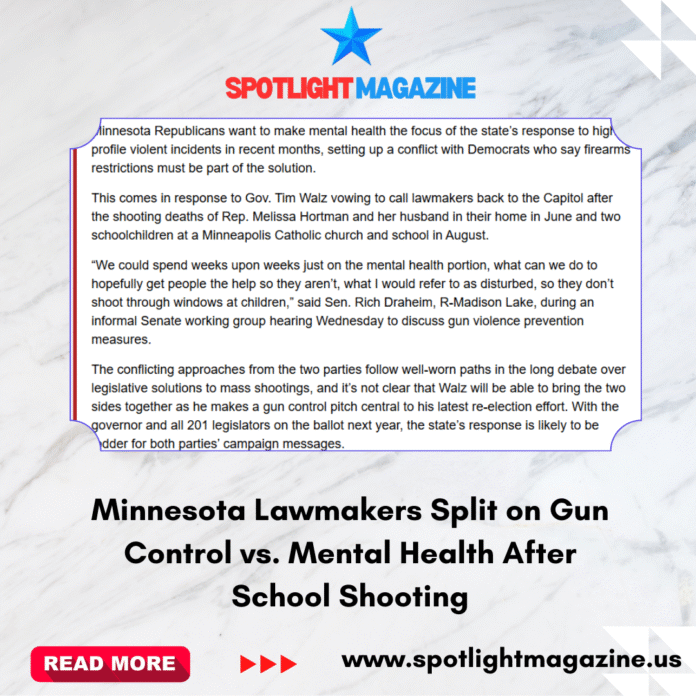Minnesota lawmakers are meeting in a special session following the tragic shooting at Annunciation Catholic School, where two children were killed. The session could lead to new gun control measures, but it’s already sparking heated debate. Some proposals have drawn sharp criticism, but there are also calls for more practical solutions.
Republicans in the state legislature are urging leaders to focus on mental health resources instead of restrictions on firearms. They argue that many violent incidents in recent months highlight the need for better mental health care. Democrats, on the other hand, are pushing for tighter gun laws as a key part of their response.
The discussion gained urgency after Governor Tim Walz promised to call lawmakers back to the Capitol in the wake of two separate tragedies this summer. In June, Rep. Melissa Hortman and her husband were killed in their home. Then, in August, the Minneapolis school shooting shocked the state when a gunman opened fire on children inside a Catholic church and school.
During a recent informal hearing on gun violence prevention, Sen. Rich Draheim, a Republican from Madison Lake, emphasized the importance of mental health solutions. “We could spend weeks just on the mental health portion, figuring out how to get people the help they need so they don’t end up disturbed and harming others,” he said. Draheim argued that investing in prevention and treatment could save lives and stop tragedies before they happen.
The divide between Republicans and Democrats follows a familiar pattern in debates about mass shootings. While Democrats argue that limiting access to guns is essential, Republicans say the real issue lies in untreated mental illness. With the governor and all state legislators facing elections next year, the outcome of these debates will likely play a big role in campaign messaging.
The case of the Minneapolis shooter highlights the complexity of the issue. According to reports, the gunman had a long history of mental health struggles. In writings left behind, he admitted to feeling suicidal for years. He described the attack as an extension of his pain, choosing a gun-free zone as his target because he knew no one would be able to stop him.
This tragic event suggests that focusing only on guns might miss the deeper problem. While firearms were the weapon used, the shooter’s mindset and untreated mental illness were what drove the attack. As some have argued, he could have caused harm in other ways, since the school was left vulnerable. At its core, the incident shows how untreated mental health crises can spiral into deadly violence.
Many Republicans believe this is where the state should direct its attention: ensuring that people in crisis have access to care before they reach a breaking point. They say that focusing too heavily on gun restrictions risks punishing law-abiding citizens while ignoring the real reasons behind such attacks.
Democrats, however, remain firm in their belief that gun control must be part of the solution. Governor Walz has made it clear that pushing for firearm restrictions will be central to his agenda as he prepares for re-election. Whether or not he can unite both parties on this issue remains to be seen.
What is clear is that Minnesota faces a difficult challenge: how to respond to tragedies like the Annunciation Catholic School shooting in a way that prevents future violence. The debate will likely continue for months, and voters will have the final say when lawmakers defend their positions at the ballot box.


